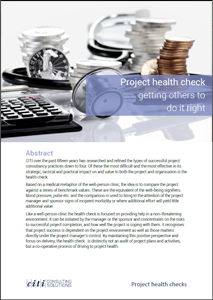 CITI over the past fifteen years has researched and refined the types of successful project consultancy practices down to four. Of these the most difficult and the most effective in its strategic, tactical and practical impact on and value to both the project and organisation is the health check.
CITI over the past fifteen years has researched and refined the types of successful project consultancy practices down to four. Of these the most difficult and the most effective in its strategic, tactical and practical impact on and value to both the project and organisation is the health check.
Based on a medical metaphor of the well-person clinic, the idea is to compare the project against a series of benchmark values. These are the equivalent of the well-being signifiers: blood pressure, pulse etc. and the comparison is used to bring to the attention of the project manager and sponsor signs of incipient morbidity or where additional effort will yield little additional value.
Like a well-person clinic the health check is focused on providing help in a non-threatening environment. It can be initiated by the manager or the sponsor and concentrates on the risks to successful project completion, and how well the project is coping with them. It recognises that project success is dependent on the project environment as well as those matters directly under the project manager's control. By maintaining this positive perspective and focus on delivery, the health check is distinctly not an audit of project plans and activities, but a co-operative process of driving to project health.
The health check can really only successfully be run by expert project managers as they bring insight and an attitude that is a critical part of the process. They will seek for data already available to the project manager and not look for special preparation - the samples they bring with are part of the picture of the patient. Quantitative data is taken 'as-is'. The process begins with a gently persistent interrogation on areas such as:









